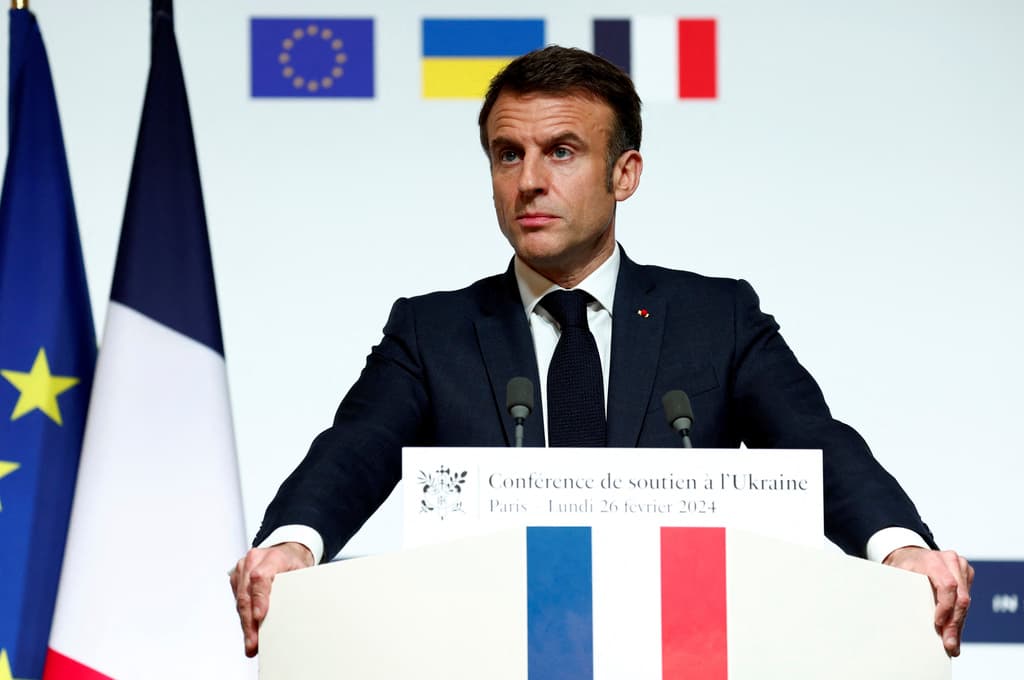Parisian Political Wolves Coming for President Macron Over the State of France’s Deteriorating Finances
Brewing discontent looks set to trigger a no-confidence vote that could conceivably topple the president — or pit him against Marine Le Pen.

President Macron likes to put on a tough guy act, whether it’s talking about Ukraine or looking macho for Instagram, but it will take more than a pair of boxing gloves to fend off the wolves of the Champs-Élysées. That is because they are beginning to howl over the shaky state of France’s finances and Mr. Macron’s apparent inattention to them.
According to France’s national statistics institute, Insee, the public debt reached 5.5 percent of the gross domestic product last year — that is more than $17 billion above what was forecast. That recent disclosure has exacerbated tensions between Mr. Macron and the National Assembly, where his Renaissance party has no majority.
Leading the pack of his opponents on the money matters is not, surprisingly, the National Rally synonymous with a presumed presidential hopeful, Marine Le Pen, but rather the more centrist, Gaullist party known as Les Républicains, or LR. That party will as soon as this week be launching a parliamentary investigation into the worsening deficit during Mr. Macron’s tenure.
Specifically, the inquiry will focus on the impact of rising debt on French purchasing power. The head of LR’s parliamentary group, Olivier Marleix, stated earlier this week that “it will be interesting to learn what kind of advice this government has been getting, and from who.”
The implication of that statement was clear, at least in Parisian circles. It means that not only will Mr. Macron’s finance minister, Bruno Le Maire, be questioned, but so will his recently appointed prime minister, Gabriel Attal. Mr. Attal, only 35, previously served as the minister of public accounts.
Monsieur Marleix seems to think it is time for an audit. He said that some ideas about managing the economy “we knew from day one would be bad.” He suggested that the Macron administration was overspending, though did not specify on what.
It looks certain that the official inquiry will begin by the end of April, which some French business newspapers are noting is just before the expected economic assessments of the economy by well-known credit rating agencies. As the weeks go on it will become increasingly difficult to separate economics from politics.
Already, a standoff over taxes looms between the executive and legislative branches. Mr. Attal recently announced new proposals concerning taxation on annuities to help cover the deficit, but how that will play out is not yet clear.
The government has previously committed to reducing by 2027 the deficit to less than 3 percent of GDP — and despite last year’s spike in debt, the financial forecast calls for more than $10 billion in savings in 2024. It’s not at all clear if Paris can make good on the more than $20 billion in spending cuts for 2025.
Incidentally, 2027 is when the next presidential election is due. Could it come before? That is for what Mr. Macron’s growing roster of critics appears to be hoping. The new parliamentary inquiry, in other words, is not only about gaining financial insights but is likely precursor to a motion of censure against the government, paired with the coup de grâce — a no-confidence vote that could topple it.
Until now Mr. Macron has operated more or less by decree, without formulating an amended budget. Doing so would mean sending it back to parliament, reviving the threat of the censure motion. It is picking up steam, because as it happens last week the LR chief, Éric Ciotti, demanded that Mr. Attal formulate an amended budget. A major party from the left, France Unbowed, subsequently announced it will table a censure motion of its own if Mr. Attal does not comply with the request.
Les Républicains have been menacing Mr. Macron with the threat of censure motion since June 2022, when the various opposition groups formed a majority in parliament. Opposition parties as divergent as the National Rally and a left-wing ecological party have tabled censure motions that failed to knock the president off his perch. Furthermore, the government survived two no-confidence motions over pension reform last year — but the ordeal weakened the government and paved the way for the resignation of the former prime minister, Elisabeth Borne.
As a Gaullist party, Les Républicains could be on to something. Just because earlier censure motions fizzled doesn’t mean that a new one will. In 1958 President de Gaulle dissolved the National Assembly, which precipitated snap elections. That situation involved de Gaulle’s refusal to accept the resignation of his prime minister, Georges Pompidou, but it started with a no-confidence measure.
Like hungry Parisians detecting uneaten steak tartare at the corner bistro, the Républicains are now sensing a window of opportunity ahead of the European parliamentary elections just two months away. Coalitions associated with the National Rally and center-right parties are already polling better than those on the left.
More than 60 deputies in the French parliament already look ready to censure the government. With France Unbowed coming on board, other parties, including the National Rally, are likely to follow. That means the momentum is building for a censure motion that could actually succeed, followed by a no-confidence vote that could come as soon as June.
In such a scenario, Mr. Macron could conceivably dissolve parliament, but in doing so he could be cornered by his own ego. When the towering de Gaulle called for snap elections, he came back even stronger. Were Mr. Macron to do so today, polls indicate that his rival, Marine Le Pen, would beat him in a snap.

